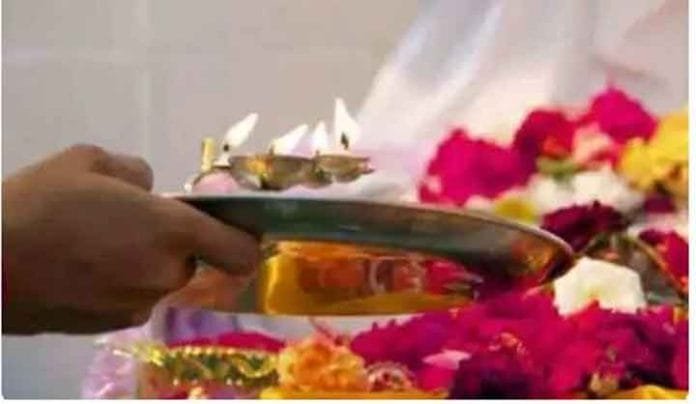INVC NEWS
Chennai – : In Sanatan Dharma, the ancient Hindu tradition, fasting is an integral part of spiritual practices. Among the various fasting festivals, Ekadashi holds a significant place as it is dedicated to the worship of Lord Vishnu, the preserver and sustainer of the universe. Ekadashi occurs twice a month, marking the 11th day of both the waxing and waning lunar phases. However, one Ekadashi stands out among the rest – Nirjala Ekadashi, which is known for its exceptional observance and spiritual benefits.
Introduction to Ekadashi Fasting and Its Significance
In Hinduism, fasting is seen as a means to purify the body and mind, enhance spiritual growth, and seek the blessings of the divine. Ekadashi fasting involves abstaining from certain foods and engaging in devotional practices throughout the day. Devotees refrain from consuming grains, beans, certain vegetables, and other restricted items during this period. Instead, they focus on prayer, meditation, and chanting the names of deities.
Explanation of Nirjala Ekadashi and Its Association with Lord Vishnu
Nirjala Ekadashi, also known as Bhimseni Ekadashi, is a unique and stringent form of Ekadashi fasting. Unlike other Ekadashis where partial fasting or eating restricted food is allowed, Nirjala Ekadashi requires devotees to observe a waterless fast for the entire day and night. This rigorous form of fasting symbolizes utmost dedication and surrender to the divine.
The association of Nirjala Ekadashi with Lord Vishnu makes it highly auspicious. Lord Vishnu is considered the supreme deity in Hinduism, known for his role as the preserver and protector of the universe. Devotees believe that observing Nirjala Ekadashi pleases Lord Vishnu and leads to spiritual elevation and fulfillment of desires.
Importance of Fasting on Nirjala Ekadashi
Fasting on Nirjala Ekadashi is believed to bring immense benefits to the devotee. It is said that observing this fast is equivalent to fasting on all the Ekadashis throughout the year. The rigorous nature of this fast helps in purifying the body and mind, washing away sins, and accelerating spiritual progress.
Moreover, fasting on Nirjala Ekadashi is often accompanied by the worship of Goddess Lakshmi, the goddess of wealth and prosperity. This combination is considered highly auspicious and is believed to bestow abundance and good fortune upon the devotee.
Rituals and Practices Followed during Nirjala Ekadashi
On the day of Nirjala Ekadashi, devotees wake up early and take a ritual bath to purify themselves. They observe a strict waterless fast, refraining from even drinking water. The entire day is dedicated to prayer, meditation, and devotional activities. Many devotees choose to visit temples and participate in special prayers conducted for Lord Vishnu.
A key aspect of observing Nirjala Ekadashi is the recitation of Shri Narayan Stotram, a sacred hymn dedicated to Lord Vishnu. This stotram holds immense power and is believed to please the Lord when recited with devotion and focus. Devotees engage in meditative practices while reciting the stotram, visualizing Lord Vishnu in their minds and surrendering to his divine presence.
Benefits of Observing Nirjala Ekadashi and Reciting Shri Narayan Stotram
Observing Nirjala Ekadashi and reciting Shri Narayan Stotram bring numerous spiritual and material benefits to the devotee. Some of the significant advantages include:
- Spiritual Purification and Cleansing of Sins: Fasting on Nirjala Ekadashi is believed to purify the soul, washing away sins and negative karma. It provides an opportunity for devotees to seek forgiveness and embark on a path of spiritual growth.
- Attaining the Blessings of Lord Vishnu and Goddess Lakshmi: By observing this special Ekadashi and performing the associated rituals, devotees invite the blessings of Lord Vishnu and Goddess Lakshmi into their lives. This can lead to the manifestation of abundance, prosperity, and overall well-being.
- Fulfillment of Desires and Wishes: Devotees believe that their sincere prayers and offerings on Nirjala Ekadashi are more likely to be fulfilled. It is a time to seek divine intervention in personal and professional matters, with the belief that Lord Vishnu grants the desires of those who approach him with true devotion.
Guidelines for Observing Nirjala Ekadashi and Reciting Shri Narayan Stotram
To observe Nirjala Ekadashi and recite Shri Narayan Stotram effectively, it is important to follow certain guidelines:
- Preparations and Precautions for the Fast: Prior to Nirjala Ekadashi, devotees should mentally and physically prepare themselves for the rigorous waterless fast. It is advisable to consult with a qualified priest or spiritual guide for guidance on specific practices and restrictions.
- Proper Pronunciation and Understanding of the Stotram: While reciting Shri Narayan Stotram, devotees should pay attention to correct pronunciation and understand the meaning behind the verses. This enhances the depth of devotion and helps establish a profound connection with Lord Vishnu.
Personal Experiences and Anecdotes of Devotees
Numerous devotees have shared their experiences of observing Nirjala Ekadashi and reciting Shri Narayan Stotram. Many have reported positive outcomes such as improved spiritual well-being, fulfillment of desires, and a sense of divine grace in their lives. These personal anecdotes serve as a testament to the power and effectiveness of these practices.
Click here to read the text of Shri Narayan Stotram in Sanskrit
Exploring the Connection between Faith, Devotion, and Desired Results
The observance of Nirjala Ekadashi and the recitation of Shri Narayan Stotram go beyond mere rituals. They are deeply rooted in faith, devotion, and the belief in the divine’s intervention in one’s life. By nurturing a strong connection with the divine and having unwavering faith, devotees open themselves up to receiving the desired results and experiencing spiritual growth.
The Significance of Devotion in Hinduism and Its Impact on Daily Life
श्री नारायण स्तोत्रम् का पाठ संस्कृत में पढ़ने के लिए यहां क्लिक करें
Devotion plays a vital role in Hinduism, permeating all aspects of life. It is the path of love, surrender, and dedication to the divine. Devotees believe that by cultivating devotion and engaging in practices like observing Nirjala Ekadashi and reciting Shri Narayan Stotram, they can attain spiritual progress and find solace in the divine’s presence.
Similar Fasting Festivals in Hindu Culture
Nirjala Ekadashi is not the only fasting festival celebrated in Hindu culture. There are numerous other Ekadashis dedicated to different deities and purposes. Each Ekadashi holds its own significance and provides devotees with an opportunity to deepen their spiritual connection and seek divine blessings.
Conclusion
Nirjala Ekadashi and the recitation of Shri Narayan Stotram offer devotees a powerful and transformative spiritual experience. By observing this rigorous fast and engaging in the devotional practice of reciting the stotram, devotees can purify their souls, seek divine blessings, and manifest their heartfelt desires. Let us embrace the sacredness of Nirjala Ekadashi and the power of Shri Narayan Stotram to enrich our spiritual journey and find fulfillment in the grace of Lord Vishnu.
FAQs
Q1: Is it mandatory to observe a waterless fast on Nirjala Ekadashi?
A1: While observing a waterless fast is the traditional way to observe Nirjala Ekadashi, individuals with health conditions or other valid reasons may modify the fast with the guidance of a qualified spiritual advisor.
Q2: Can anyone recite Shri Narayan Stotram, or is it reserved for a specific group of people?
A2: Shri Narayan Stotram can be recited by anyone with sincerity and devotion. It is open to all individuals seeking the blessings of Lord Vishnu.
Q3: Are there any specific timings for reciting Shri Narayan Stotram on Nirjala Ekadashi?
A3: While there are no strict timings, it is advisable to recite Shri Narayan Stotram during the Brahma Muhurta, which is the auspicious time before sunrise. However, devotees can recite it at any time with pure intentions.
Q4: What if I cannot recite the entire Shri Narayan Stotram? Can I recite a portion of it?
A4: While reciting the entire stotram is ideal, if circumstances prevent you from doing so, you can recite a portion of it with utmost devotion and focus.












